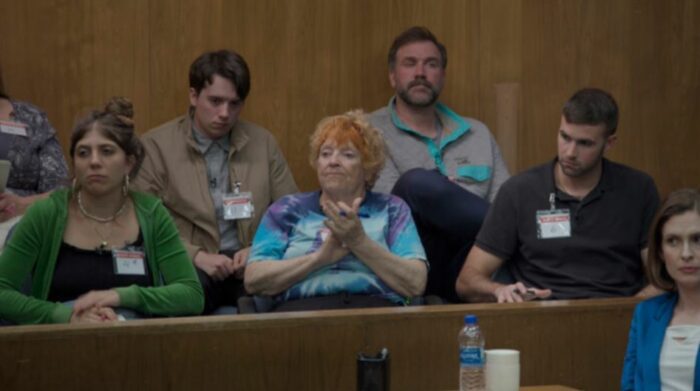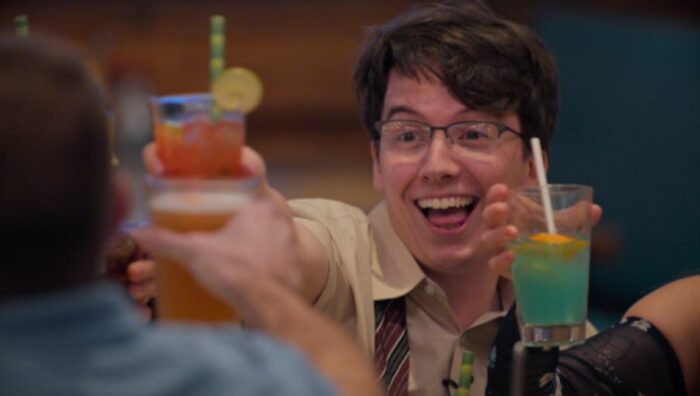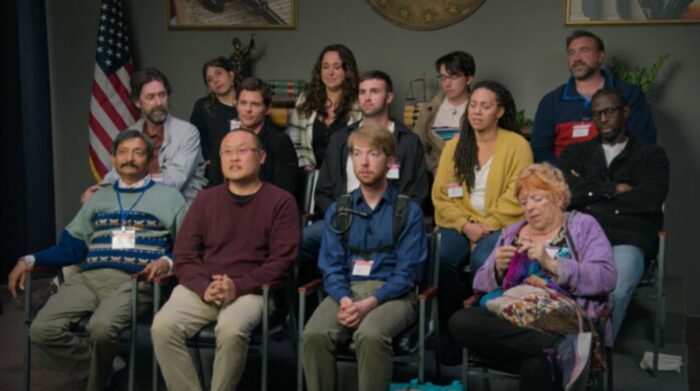The following piece contains spoilers for Season 1 of Jury Duty, created by Lee Eisenberg and Gene Stupnitsky.
I would describe my one and only experience serving on a jury as routine. We tried a case where a habitual offender attacked someone, there were multiple witnesses, there was plenty of relevant evidence, and the defendant could identify her attacker. Including jury selection, the trial, and sentencing, we were out of there in three days. I got my eight dollars per day, had BBQ from the restaurant down the street three times, and was gifted a signed note to take back to work confirming my service.
I’m not sure how Ronald Gladden will look back and describe his first time serving on a “jury,” but I can guarantee that he will never use the word “routine.” In fact, Gladden may have just found himself in the strangest courtroom since the time Jim Carrey couldn’t lie to Jennifer Tilly. But it turns out none of it was real.
That, in a nutshell, is the premise of Jury Duty, currently airing on Amazon Freevee.
One part Candid Camera, one part Punk’d, and one part Impractical Jokers, Jury Duty is a refreshing, deeply entrancing kind of reality television. I use the term “reality television” loosely because it turns out the show was heavily scripted and choreographed down to the finest detail. It’s just that the star of the series, Home Depot project manager Ronald Gladden, was completely in the dark.

Gladden, a southern California resident, responded to a Craigslist ad about appearing in a documentary centered around serving on a jury. Amazon placed the ad and apparently screened almost 4,000 people before they found their star. And as strange as the process for this must have been for Gladden, it would prove to be the most normal part of the entire three-week ordeal.
What the producers of Jury Duty had in mind for Gladden would go on to make even the most iron-stomached The Office and The Rehearsal fans cringe. A series of mostly unknown character actors and improv artists served alongside Ronald in the fake jury. The co-lead of the show is James Marsden who plays an oversized, self-centered, slightly pretentious version of himself, nailing the narcissistic actor trope along the way. Sharp-eyed television viewers likely would also recognize Kirk Fox (Sewage Joe from Parks and Recreation, who plays Pat McCurdy) or perhaps a couple of other faces. But Ronald is the perfect test case at the first gathering of potential jurors. He recognizes Marsden from the X-Men movies and Sex Drive (of all movies) and no one else in the juror pool. The trap was officially set.
In addition to the jurors, the judge, lawyers, defendant, plaintiff, security guards, waitresses, motel staff (they are sequestered for a low-level civil trial somehow), and even the paparazzi are all fake. In addition to a symphony of actors following a loose script of how the trial should proceed, the producers would put their thumb on the scales in favor of the challenges they wanted Gladden to face. He is voted foreperson of the jury. He rooms next to the most awkward juror (and they have co-joining doors), and their phones are confiscated at the beginning. The only contact Ronald Gladden has is with his fellow jurors and the documentary crew preserving his experience.
Over the first seven episodes of the series (there are eight total), the producers and directors proceed to present Gladden with a gauntlet of unusual and sometimes morally ambiguous trials to test not only how far he will go as a juror, but also how much he can stand as a human being.
Before all is revealed to Gladden at the end of Episode 7, a full trial occurs in the renovated courtroom staged for this show. Gladden serves as the de facto captain of the jury, dissects evidence, navigates juror conflict, and leads his peers to a unanimous decision. But every step along the way is more quicksand waiting to lure Gladden into another one of the producers’ awkward traps, and they do not pull their punches with our unaware hero.
Some of the stunts are harmless and relatively mundane, as when a fellow juror keeps falling asleep and the judge tells Gladden that his job as the foreperson is to make sure she is always awake. A juror shows up one day wearing his own invention of chair-pants (or Chants!) and Gladden is forced to intervene.

Others are certainly more cringe-inducing but still relatively harmless, such as when a buttoned-up male juror gets drunk for the first time and calls his girlfriend to accuse her of cheating. In the aftermath, Gladden is pulled into the middle by first getting on the phone to provide support for the boyfriend, but is later asked to play wingman while the boyfriend attempts “soaking” with one of the other female jurors to get around his self-imposed rules on pre-marital sex (seriously, you just have to see it).
And while each of these incidents becomes more and more ludicrous than the last—at one point Gladden admits to the camera crew, “there have just been so many weird and crazy things that have come up“—towards the end of the series is when the show starts doubling down. They present him with significant moral dilemmas that require his response. When Gladden learns a juror is voting a certain way because he wants to avoid going back to his broken home life, the jurors nudge Gladden into trying to get him to change his mind. Another juror teaches Gladden a new game and quickly is $2,000 in debt to Ronald but admits he doesn’t know how he will ever pay it off.
All of this is happening while Gladden sits down and relays to the documentary camera day after day that he is struggling over ideas of ineffective counsel for the defendant, reputational loss for the plaintiff, and being a fair arbiter when it comes time to render a verdict.

After the curtain is finally pulled back as a cliffhanger to Episode 7, the finale offers up an unexpected and rewarding palate cleanser that provides an emotional payoff I never anticipated.
The show, it turns out, started out with a premise of how Ronald Gladden would respond to so many unexpected and unrealistic hurdles. But what they got was a show about who Ronald Gladden is as a person. Ronald Gladden ended up being someone who represents the best of us.
He was the man who made sure the awkward juror was always treated with respect and was included in the group activities. He was the man who empathized with the juror whose home life was a mess. He was the man who ran lines with James Marsden when Marsden was doing his best Charlie Sheen-Gary Busey mash-up. He was the man who, instead of badgering a juror to stay awake, explained why she needed to stay alert and asked how he could help.
Alan Barinholtz, who plays Judge Alan Rosen, summed it up best as he dropped the bomb on Gladden that this was a massive play staged around just him. He admitted to Gladden,
“You were presented day after day with countless challenges, responsibilities, and ethical dilemmas…You used your innate sense of compassion and reason to lead the jury to a verdict. We’ve considered all the evidence presented during your trial, and we’ve decided that you, Ronald Gladden, are a hero.”
In the era of peak cringe television, what Jury Duty unwittingly found was peak kindness. They found the man that wouldn’t let even the wildest possible scenarios get in the way of being decent to other people who were nothing like him. Whether it was the expected outcome or not, we discover Ronald Gladden is the new kind of hero that we need and that we deserve.

